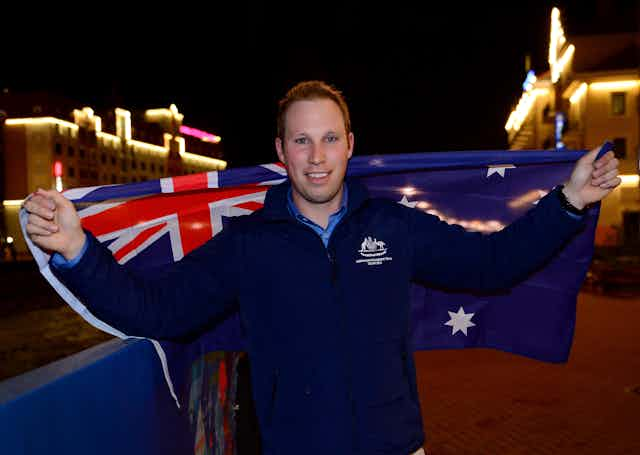The Winter Olympic Games has finished up in Sochi, but our Paralympic athletes are preparing themselves to compete in two of the six disciplines scheduled at the Winter Paralympic Games. So who are they? And what will they have focused on in the run up to the Games?
The Australian team has a total of 11 athletes, including six alpine skiers, two sighted guides and, for the first time, three snowboarders.
The experience level of the alpine skiing component of the squad is strong, with all but one of the athletes having competed previously at a Paralympic Games, and all athletes having won medals over the two most recent World Cup seasons.
Victoria (Tori) Pendergast, Australia’s first female sit-skier, will make her Paralympic debut, while Cameron Rahles-Rahbula has come out of retirement to compete in his fourth Games at 30 years of age.
Rahles-Rahbula, a leg amputee, picked up two bronze medals in the slalom and super-combined events four years ago at the Vancouver Games, and will be no doubt be focused on pushing himself to his limits once again in his final Paralympic Games despite an injury yesterday while training on the downhill course.

As the Para-snowboard discipline makes its debut on the Paralympic program in Sochi, so too will Australian snowboarder Ben Tudhope.
Tudhope, who was born with cerebral palsy and partial paralysis of his left side, will become the youngest athlete to compete for Australia at a Winter Paralympic Games when he lines up in the new discipline at just 14 years of age.
As expected, there is a lot that is involved in preparing an athlete for such an event. Of course, there are the endless hours of training that have to be put in to ensure that each of the athletes is fit and ready to perform at their peak – but there is also a long list of other, more obscure, factors that need to be taken into account.
Common challenges
Preparation for the Olympics for athletes, whether or not they have a disability, is a huge ordeal.
There is a long list of potential stressors that can have a detrimental impact on athletes’ stress and confidence levels leading up to the event. These include, and are not limited to:
- the physical and psychological effects of long-haul flights
- adjusting to new foods
- sharing a room with others for long periods of time
- poor sleep quality
- abiding by team rules
- home-sickness
- fatigue and stress that may come with travelling to and from competition venues
- always being in the company of others.
Unique challenges

Athletes with disabilities face all of these same issues when preparing for the Paralympic Games – but they can also be faced with a unique set of physiological and psychological challenges which have the potential to disrupt their preparation.
In order to combat this, it is essential that the medical and sport science support staff are fully familiar with each individual athlete’s inherent disability and related medical conditions.
Further to this, athletes with an intellectual or visual impairment may require additional care and assistance to provide them with the best opportunity to experience a smooth transition into competition.
From a psychological perspective, for some athletes, merely entering a plane or finding their way around the team accommodation or competition venue can be a source of additional stress.
Visually-impaired athletes may require assistance to help them orient to their new environment. When on a long-haul flight, for instance, finding the way to the bathroom facilities and back in a darkened cabin can present them with a challenge that others may not encounter.

Due to the increased amount of cognitive effort that can be required, such experiences may impact upon the athlete’s overall stress and/or energy levels, which can impair performance.
Support staff can relieve some of this pressure by checking in with relevant athletes to see if they have any questions, or by simply ensuring that they feel comfortable in their surroundings.
From a physiological perspective, for athletes who are missing limbs and/or wearing prosthetic limbs, good stump care is a key part of the preparation process.
It can help to avoid possible infection and the impact this can have upon performance. The overall aim while travelling, as well as prior to competition, is to not place any unnecessary stress on their stumps.
Athletes are advised to wear compression garments on their stumps to prevent unwanted swelling during long haul flights, particularly if they remove their prosthesis during the flights.
They should also be reminded to try to avoid excessive walking in the days leading up to their event to prevent unnecessary fatigue, as well as the risk of breaking down the protective outer layer of the skin.
The one universal, whatever the discipline, whatever the circumstances of the athlete, is the desire to achieve Paralympic glory – and for us, the desire to see top-level competition.
This article was co-authored with Caron Jander, a consultant occupational physician affiliated with the Australian Paralympic Swim Team.
Related reading: Chill out, cool down … athlete anxiety at the Winter Games
The Australian Sochi 2014 Paralympics team
Alpine skiing
Jessica Gallagher – Geelong, VIC
Christian Geiger (guide for Jessica Gallagher) – Bright, VIC
Mitchell Gourley – Geelong, VIC
Toby Kane – South Melbourne, VIC
Victoria Pendergast – Gosford, NSW
Melissa Perrine – Welby, NSW
Andrew Bor (guide for Melissa Perrine) – Tugun, QLD
Cameron Rahles-Rahbula – Geelong, VIC
Snowboard cross
Joany Badenhorst – Griffith, NSW
Trent Milton – Bonny Hills, NSW
Ben Tudhope – Seaforth, NSW

